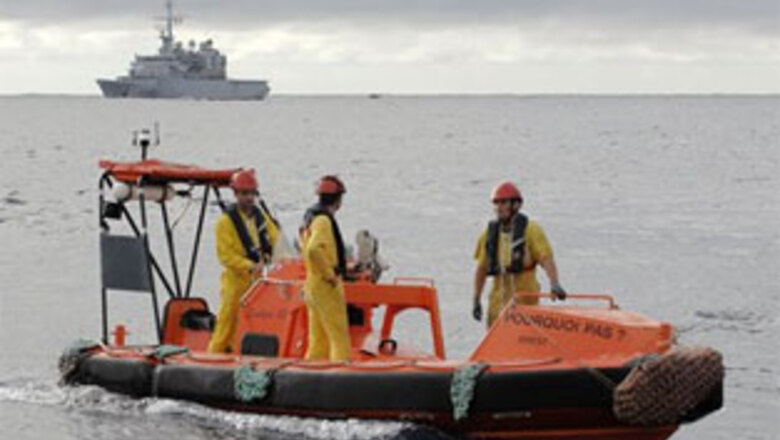
views
Paris: Authorities are most unlikely to recover all parts of the Air France plane that went down June 1 in the Atlantic Ocean with 228 people aboard, an official with France's air accident investigation board said Wednesday.
The cause of the crash is not yet known, but investigators are "getting a little bit closer" to determining it, said Paul-Louis Arslanian, Director of Bureau d'Enquetes et D'Analyses (BEA).
Arslanian added that it was uncertain whether authorities would be able to find all of those who died when the Airbus A330 crashed. So far, 50 bodies have been recovered, according to Brazilian authorities.
Air France Flight 447 went down in stormy weather while flying from Rio de Janeiro, Brazil, to Charles de Gaulle airport in Paris.
The exact location of the crash has not been determined because ocean currents have moved the bodies and debris that have been found. The search area spans about 19,000 square kilometers (7,720 square miles), officials said.
The investigation is focusing on the on-board speed sensors which may have given incorrect information to the pilots as they battled to fly through the terrible conditions.
Air France is currently replacing the sensors on its Airbus A330s but those on the doomed plane had not yet been replaced, the airline said
Air France has promised that no Airbus A330 or A340 will take off unless at least two of its three Pitot tubes have been replaced. The tubes are an instrument contained in the speed-sensing system.
Terrorism has not been ruled out as a possible cause of the crash though and a French news magazine has reported that two of the passengers on the flight had names linked to Islamic terrorism.
Air France had noticed over the past year that Pitot tubes sometimes briefly iced up at high altitude on A330s and A340s, the airline said this month. That caused "a loss of airspeed data," according to the airline, which meant the pilots didn't know the plane's speed.
Investigators are still looking into the 24 automated error messages sent by the plane in the four minutes before it crashed, Arslanian said Wednesday. The error messages all have to do with "loss of validity of information about speed," which can cause some on-board instruments to stop functioning, Arslanian said.
But the focus for investigators and search teams in the Atlantic remains finding the plane's data recorders, which send out an audio signal for at least 30 days after a crash.
"We consider these 30 days to be the only thing that we can be sure of," Arslanian told a news conference in Paris.
The depth in the search area varies from 1,000 to 4,600 meters (3,280 to 15,091 feet), BEA officials said, making the search for the recorders -- and the rest of the plane's debris -- very difficult.
"It is as if it fell in the Andes," said Olivier Ferrante of the BEA.
Investigators hope the data recorders will provide valuable information about the cause of the crash, but they know that's not a guarantee, Arslanian said.
"I cannot say to you that when we have them we will have everything, we will know everything," he said. "And I cannot say that if we don't have them, then the inquiry is stopped."
Likewise, while investigators are looking closely at all the debris pieces recovered so far, not all of them have the same interest and importance, he said.
"I understand that the families (of the victims) want to know what happened," Arslanian said. "The only message I can give them is that at the moment ... we are working as quickly and intensely as possible in order to one day find out what happened and what we may do in order to make aviation safer."



















Comments
0 comment